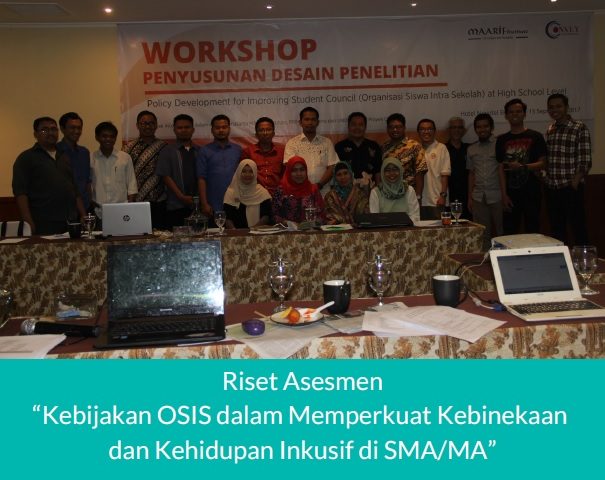Research Assessment and Policy Development for Improving Student Council (Organisasi Siswa Intra Sekolah) at High School Level

Database on Salafism in Indonesia
February 26, 2019
Assessment on Existing Economic Skills-Oriented Program for Youth in accordance to Counter Violent Extremism
February 26, 2019Religious Education, as in regard to its national function, comply to support national development progress towards better civilization and character building of the young citizens. In a further context, religious education helps create a social cohesion, integrate people based on its religions, as well as increase inter-religious harmony, including unify Muslim people from different backgrounds or groups. However, on the contrary, researchers found that religious education conducted at schools has in fact become the entry point for radicalism and intolerant views infiltration. Thus, the institution not just turns out to be supporting polarization of Muslim people, or inter-religious groups, but also all citizens at fundamental background cases.
This matter actually begun since early democratic era of ’98, which allowed universities and -in subtle form- schools to be an open stage of contesting ideologies either liberalism, conservatism, and even radical Islamic movement which seems to have gained popularity among youngsters. This circumstance at the end of the day has led to violent incidents and attacks did by students or young people. And as much as college students could be a massive powerful march for social transformation, there has not been any study on how students (high school) could perhaps do the same way or another. Despite many research evidences showing intolerant opinion and actions among (high school) students.
This research, executed by researchers of MAARIF Institute for Culture and Humanity under CONVEY initiative explored at how actually national policy or regulation applied or functioned upon high school institution, at specific for its student council role in integrating students from all backgrounds and support for nationalism and character building. The research hence foundthat radicalism and intolerant views has infiltrated schools from at least three main doors: alumni, teachers, and schools’ policy (headmaster). Besides the fact that regulations of Student Council is somewhat overlapped in national policy structure, thus led to schools tend to reduce Student Council’s capacity in conducting (extracurricular) activities only on religious aspect, not in supporting nationalism and multiculturalism values among students.
Check further findings and analysis on the book “Menjaga Benteng Kebinekaan di Sekolah” (Revitalize the Fort of Multiculturalism at Schools), and the book report “OSIS Mendayung di Antara Dua Karang: Kebijakan Sekolah, Radikalisme dan Inklusivisme Kebangsaan” (Student Council, Rowing Between Two Reefs: School’ Policy, Radicalism, and National-Inclusivism). The research also advocate some evidence-based strategic policy recommendations in specific to the Ministry of Education and Culture. Check out the policy brief written in Bahasa here, or the English version here.
2.2-Fact-Sheet-MAARIF_2_2_



